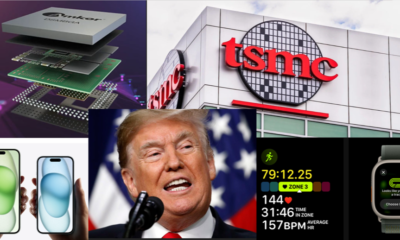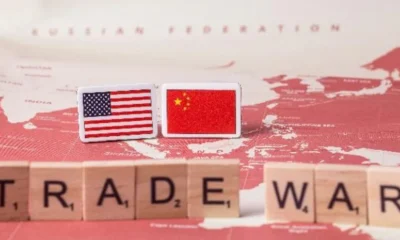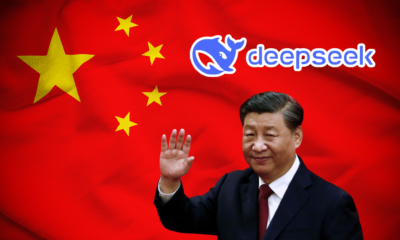Published
1 year agoon

As Donald Trump takes the reins of the United States once again, the global stage is abuzz with speculation. His presidency has always been marked by bold moves, divisive rhetoric, and a penchant for reshaping alliances.
For India, this return to power signals both opportunities and challenges in equal measure. The fact that Chinese President Xi Jinping was personally invited to Trump’s inauguration while Indian Prime Minister Narendra Modi wasn’t, has sparked debates. But does this really reflect the dynamics between India and the US, or is it just ceremonial optics?
Well, the answer – once we decode certain important points, what Trump’s presidency could mean for India, especially in light of its relationships with China, Pakistan, and Bangladesh.
1) India’s Strategic Role In Then Indo-Pacific
One of the most significant shifts expected under Trump’s leadership is the revival of the Quad Alliance, which includes India, the US, Japan, and Australia. This strategic grouping, aimed at countering China’s growing aggression in the Indo-Pacific, is likely to take center stage once again.
But what does it mean for India?
For India, this isn’t just about being a part of a regional alliance; it’s a chance to strengthen its maritime and defense capabilities. Between 2015 and 2023, India’s defense imports from the US grew by a staggering 50%, according to SIPRI data. With Trump back in the White House, we can anticipate an acceleration in defense technology transfers and collaborations that will strengthen India’s position in this volatile region.
2) Deep States And US -India Defense Ties
Another intriguing aspect of Trump’s presidency is his open criticism of the US “deep state,” which he has accused of favoring wars over diplomacy.
This stance could be a boon for India.
A less interventionist US foreign policy might translate into more focused efforts on empowering allies like India, especially in counterbalancing China. Strategic deals, such as the S-400 waiver and access to advanced drone technologies, could be fast-tracked, providing India with the edge it needs in defense preparedness.
3) The Russia-Ukraine War And Its Impact
Meanwhile, the ongoing Russia-Ukraine war continues to cast a long shadow over global stability. Trump has repeatedly signaled his intention to broker peace between the two nations—a move that could have profound implications for India.
Stabilizing global oil markets would be a welcome relief for India’s economy, which suffers every time crude prices spike. To put things into perspective, every $10 increase in crude prices adds $15 billion to India’s annual import bill.
Furthermore, with India relying on Russia for nearly 45% of its military equipment, a prolonged conflict risks disrupting critical defense projects like the S-400 missile system. A resolution, therefore, would serve India’s strategic and economic interests.
4) US-China Trade War
Trump’s hardline approach to China also presents India with a unique opportunity.
His trade restrictions and sanctions against Beijing align perfectly with India’s aspirations to emerge as a global manufacturing hub. With a $10 billion push for semiconductor production and record FDI inflows of $83 billion in 2023—much of it redirected from China—India is well-positioned to fill the gaps in global supply chains.
This shift could also strengthen India’s partnership with the US in critical sectors like electronics, pharmaceuticals, and renewable energy.
5) Trump And Pakistan
Pakistan, too, finds itself in a precarious position under Trump’s leadership. His administration previously cut $1.3 billion in aid to Pakistan, citing its ties to terrorism. This scrutiny opens the door for stronger US-India counterterrorism collaborations and diminishes global support for Pakistan’s agenda. For India, this is an opportunity to further isolate Pakistan diplomatically and strengthen its position in the region.
6) US-India Trade Tensions
However, not everything is rosy. India’s trade surplus with the US, which stood at $43 billion in 2023, could become a point of contention. Trump’s history of targeting trade imbalances might lead to tariffs on Indian goods, which could hurt sectors like textiles and IT services. To mitigate this, India will need to negotiate better market access for its services sector, ensuring that any losses in goods trade are offset by gains elsewhere.
7) The Question Of Bangladesh
Then there’s Bangladesh, a nation increasingly caught in a geopolitical tug-of-war. Rising Chinese investments and internal instability have raised concerns about its trajectory, with some likening it to Pakistan’s descent into becoming a rentier state.
The Trump administration’s likely push for a neutral and democratic Bangladesh aligns with India’s interests in maintaining regional stability. A Bangladesh free from deep state interference would be a win for India, ensuring that its neighbor doesn’t fall into China’s orbit.
Thoughts….
Through all of this, Prime Minister Modi’s role in shaping US-India relations cannot be overstated. While Modi wasn’t invited to the inauguration, External Affairs Minister S. Jaishankar’s prominent seating at the event is an ode to India’s growing importance.
Modi’s personal rapport with Trump has historically influenced bilateral ties, and this dynamic is expected to continue. Additionally, the Adani Group’s infrastructure projects in the US could play a key role in reducing American reliance on Chinese dominance, further cementing India’s strategic importance.
The Final Words


Taiwan’s ‘Historic’ TSMC Deal, A Win Or The End Of Its ‘Silicon Shield’ As China Threatens? A Jittery Taiwan Watches Trump’s Moves On Ukraine, Wondering, Could We Be Next?


A Trade War That Just Won’t Quit. As Trump’s Tariffs Hit, China Stays The Course, For Xi’s Its Business As Usual Strategy


Indian Stock Market In Turmoil. Investors In Panic Mode, Is This A Temporary Correction Or The Start Of A Bear Market?


America And China’s Thirst For Gold In 2025 Is Draining Other Countries’ Reserves; Here’s Why?


Shakeup In The Auto Sector. Mercedes-Benz 15% Job Cuts, Nissan CEO Exit, And Germany’s Make-Or-Break Year


DeepSeek Ai Rush. China’s AI Contender Gears Up for Next Big Launch Even As It Gets Xi Jinping’s Blessings
